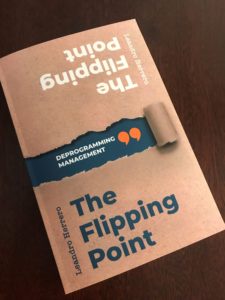Following on from one of the topics discussed during yesterday’s thought-provoking webinar on The Myths of Management – leadership and control. Thank you to everyone who joined us, from all corners of the globe!
________________________________________________________________________________________________
Fear of losing control is a funny thing. It does not seem to correlate with how much control you have in the first place.
I find that leaders who in fact have very little control, but who think this is not the case, fear losing control and talk a lot about it. Typically my teams encounter this in the context of a Viral Change™ programme, in which the engine of change is in the grassroots, and leadership is distributed in the form of highly connected ‘activists’ who are shaping the organization in an orchestrated, bottom up, peer-to-peer way. The contrast with a traditional ‘change programme’ of top down communication type, with lots of cascading workshops through the hierarchical lines, is striking.
Very often leaders feel that, in the old-fashioned top down way, they are in control, and that in Viral Change™ they lose/may lose/will lose control. This is actually not a hard one for us to redirect because it’s exactly the opposite. The only control you have in top down systems is the number of workshops, the number of people attending and the content. Once this is done, you close your eyes and pray. You have very little control on what happens next, even from the time of people returning to the car park.
In the Viral Change™ antipode territory, the pool of highly connected people engaged and leading, working with us, (activists, champions, connectors) are so close to the ground on a day-to-day basis that you know what is going on, by the minute if you wanted. Paradoxically, Viral Change™ provides higher levels of control than the traditional top-down change systems.
But this is not the topic. The topic is how many leaders kid themselves thinking that they have great control in the first place, something that they fear they may lose, which is unsettling to them. But to lose something you have to have it first, and, believe me, this is not always the case.
Control is often, in fact, ‘an illusion of control’ only fuelled by the times you see an input and output working. You asked people to attend a seminar, they did. You prepare a communication package and digitalised it in powerpoints, and it has been cascaded down to all. Is this control? Only of the information tsunami. Try the same with changing behaviours.
My rule of thump is to always ask my clients to reflect on ‘how much (control) they have’ before addressing the ‘how much they will lose’. Never allow the conversation into losing without knowing how much is in the bank.
A wonderful way to stop worrying about losing control is to realise that you don’t have much in the first place. Then to figure out the level of control ‘required’. This is a conversation for another day.
________________________________________________________________________________________________
The ultimate role of the leader is to lose control. The more control you lose, the more you actually have. If you can’t afford to lose control ‘because it may cause chaos’, the problem is you. In the best case, you don’t have the right structure behind you. So, the problem is you. Or you inherited it. Still you. In the worst case, you have created that structure. The problem is you big time. Leadership development equals bits of control I want to lose per month.
Extract taken from my new book: The Flipping Point – Deprogramming Management [1]. Available Now!
A flipping point in the trend for adopting absurd management ideas needs to be reached. Management needs deprogramming. This book of 200, tweet-sized, vignettes, looks at the other side of things – flipping the coin. It asks us to use more rigour and critical thinking in how we use assumptions and management practices that were created many years ago.

Our real and present danger is not a future of robots and AI, but of current established BS. In this book, you are invited to the Mother of All Call Outs!
________________________________________________________________________________________________
Join forces with us!
Contact us [2] if you’re interested in a tailored webinar, based on topics from our Feed Forward Series, delivered to your team or organization by me and The Chalfont Project team.